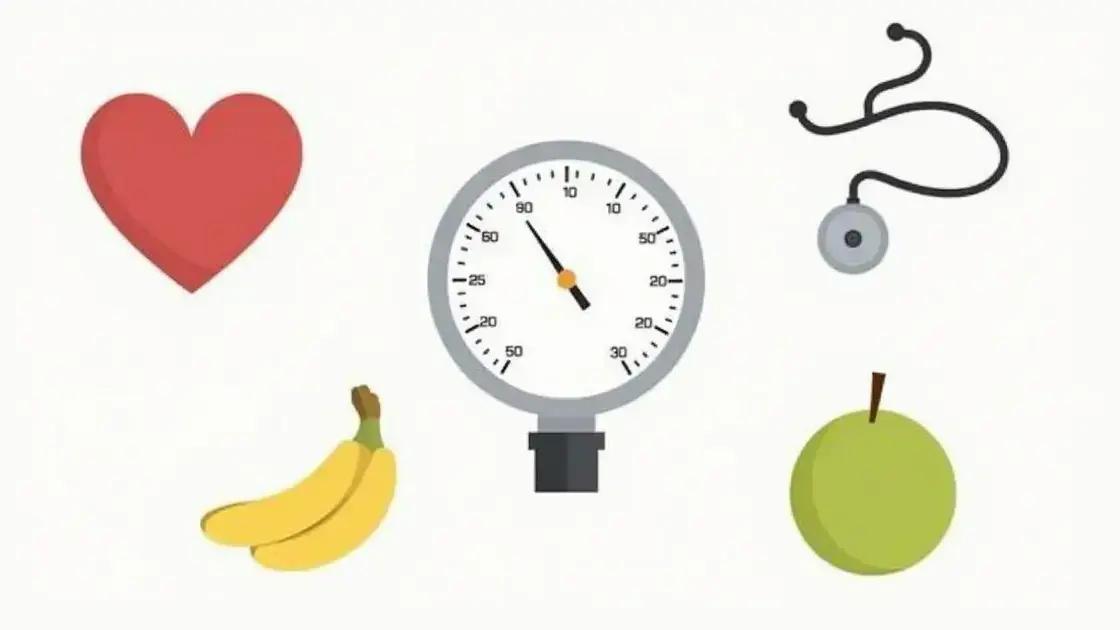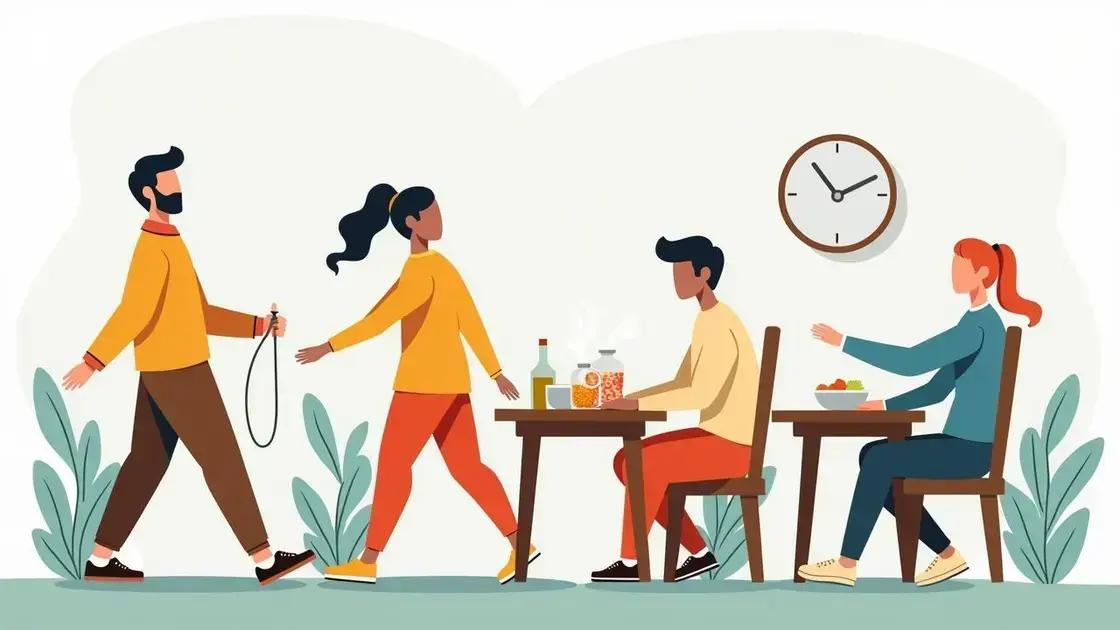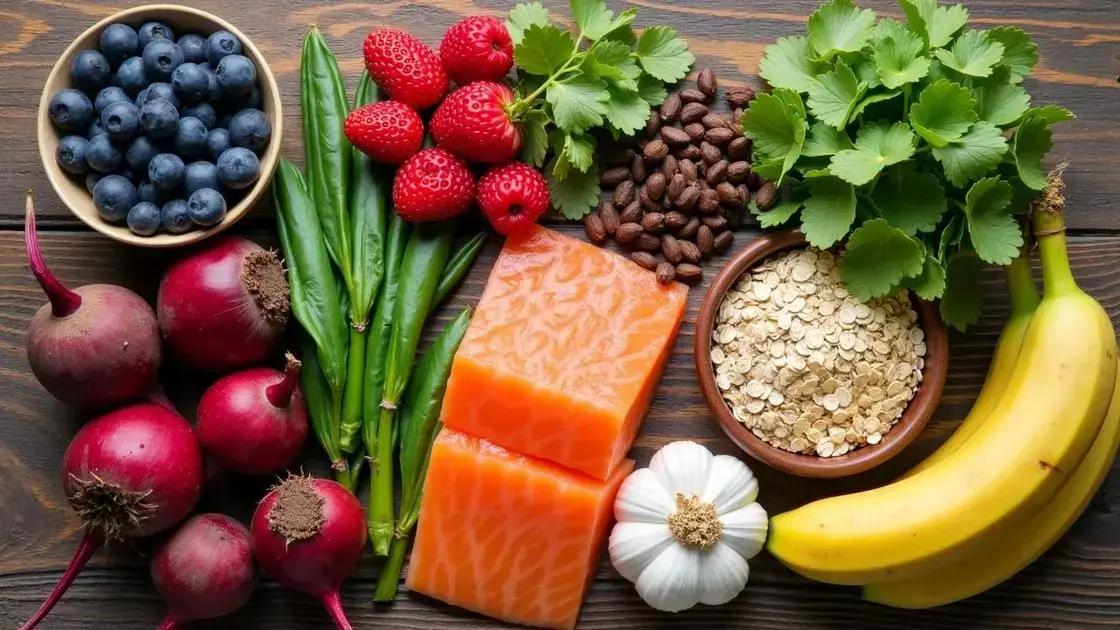To lower blood pressure naturally after 50, focus on regular exercise, managing stress, maintaining a healthy weight, and incorporating potassium-rich foods like berries, beets, leafy greens, oats, fatty fish, garlic, and bananas into your diet.
As we age, keeping our blood pressure in check becomes increasingly important for overall health. Knowing how to lower blood pressure naturally after 50 is essential for maintaining wellness and preventing cardiovascular diseases. In this article, we will delve into effective methods that incorporate lifestyle changes, dietary adjustments, and natural remedies to help you achieve a healthier blood pressure level.
Understanding Blood Pressure and Its Importance

Blood pressure is the force of blood against the walls of your arteries. It is measured in millimeters of mercury (mm Hg) and is recorded with two numbers: systolic and diastolic. The systolic pressure (the first number) measures the pressure when your heart beats, while the diastolic pressure (the second number) measures the pressure when your heart rests between beats.
Why Blood Pressure Matters
Understanding blood pressure is crucial for your health, especially as we age. High blood pressure, or hypertension, can lead to serious conditions such as heart disease, stroke, and kidney problems. Regular monitoring can help you stay informed about your cardiovascular health.
Know Your Numbers
Normal blood pressure is typically around 120/80 mm Hg. Blood pressure readings above this threshold may indicate prehypertension or hypertension, which requires attention. Knowing where you stand can help guide your lifestyle choices and keep potential risks in check.
Impact of Aging
As you age, your blood vessels can become stiffer, which may raise your blood pressure. Understanding this change helps you be proactive, allowing for early interventions if necessary. This is vital for individuals over 50 who need to be more vigilant about their health.
Natural Ways to Lower Blood Pressure

There are various natural methods to help lower blood pressure effectively. Incorporating these strategies into your daily routine can result in significant improvements in your cardiovascular health.
Regular Exercise
Engaging in regular physical activity is one of the best ways to lower blood pressure. Aim for at least 30 minutes of moderate exercise most days of the week. Activities like walking, swimming, or cycling can be very beneficial.
Stress Management
Chronic stress can contribute to high blood pressure. Practicing relaxation techniques such as deep breathing, meditation, or yoga can help reduce stress levels. Find time each day to unwind and focus on your mental well-being.
Adequate Sleep
Getting enough sleep is crucial for maintaining healthy blood pressure. Aim for 7-8 hours of quality sleep each night. Poor sleep can lead to increased stress levels and high blood pressure.
Stay Hydrated
Drinking enough water can help your body maintain optimal blood pressure levels. Aim for at least 8 glasses of water a day. Staying hydrated helps your heart work more efficiently.
Limit Alcohol and Caffeine
Excessive consumption of alcohol and caffeine can lead to increased blood pressure. Limiting your intake can help manage your blood pressure levels. Consider reducing your consumption and opting for herbal teas or water instead.
Lifestyle Changes for Healthy Blood Pressure

Making specific lifestyle changes can significantly impact your blood pressure levels. Here are some effective adjustments you can make to promote healthier blood pressure.
Maintain a Healthy Weight
Being overweight can increase your risk of high blood pressure. Aim to achieve a healthy weight by balancing the number of calories you consume with the number of calories you burn. Simple changes like taking the stairs or walking for 20 minutes daily can help.
Follow a Balanced Diet
Eating a diet rich in fruits, vegetables, whole grains, and lean proteins can benefit your blood pressure. Focus on foods high in potassium, which can help balance out the negative effects of sodium. The DASH diet (Dietary Approaches to Stop Hypertension) is particularly beneficial.
Reduce Sodium Intake
High sodium intake is linked to increased blood pressure. Aim to keep your sodium consumption below 2,300 milligrams per day, and ideally, limit it to 1,500 milligrams if you’re sensitive to salt. Opt for herbs and spices to flavor your food instead of salt.
Quit Smoking
Smoking causes temporary spikes in blood pressure and can damage your blood vessels. Quitting smoking can lead to a significant decrease in blood pressure over time, as well as improve your overall heart health.
Limit Processed Foods
Processed foods are often high in sodium, unhealthy fats, and sugars. Reducing your intake of these foods, including snacks and fast foods, can help improve your blood pressure levels and overall health.
Foods that Help Lower Blood Pressure Naturally

Incorporating specific foods into your diet can significantly help lower blood pressure naturally. Here are some of the best options to consider:
Berries
Berries, especially blueberries and strawberries, contain anthocyanins, which have been linked to lower blood pressure. Enjoy them fresh, in smoothies, or as a topping on your favorite yogurt.
Beets
Beets are high in nitrates, which can help relax blood vessels and improve blood flow. Consider roasting beets, adding them to salads, or drinking beet juice to reap the benefits.
Leafy Greens
Vegetables like spinach, kale, and Swiss chard are rich in potassium, which can help lower blood pressure. Incorporate these leafy greens into salads, smoothies, or as a side dish.
Oats
Oats are a great source of fiber and can help lower cholesterol levels, positively impacting blood pressure. Start your day with a warm bowl of oatmeal topped with fruits and nuts for added health benefits.
Fatty Fish
Fatty fish such as salmon and mackerel are high in omega-3 fatty acids, which can help reduce blood pressure levels and promote heart health. Aim for at least two servings of fatty fish per week.
Garlic
Garlic has properties that can help lower blood pressure by increasing nitric oxide levels in the body. Adding garlic to your meals can provide flavor and health benefits.
Bananas
Rich in potassium, bananas can help balance sodium levels and reduce blood pressure. A quick and healthy snack, bananas can be enjoyed on their own or added to smoothies and cereals.
In Summary: Achieving Healthy Blood Pressure Naturally
Lowering blood pressure naturally after 50 is achievable through a combination of lifestyle changes, dietary adjustments, and by incorporating specific foods into your daily routine.
Engaging in regular exercise, managing stress levels, and getting adequate sleep are essential steps. Additionally, focusing on a balanced diet rich in fruits, vegetables, whole grains, and healthy fats can help you maintain optimal blood pressure levels.
Foods like berries, beets, leafy greens, oats, fatty fish, garlic, and bananas are excellent choices to include in your meals. These foods not only taste great but also provide numerous health benefits.
By making these informed choices, you can enhance your overall well-being and effectively manage your blood pressure as you age.
FAQ – Frequently Asked Questions about Lowering Blood Pressure Naturally
What are the best natural ways to lower blood pressure?
The best natural ways to lower blood pressure include regular exercise, stress management, a balanced diet, adequate sleep, and hydration.
How can diet impact blood pressure?
A diet rich in fruits, vegetables, whole grains, and low in sodium can significantly help in managing blood pressure levels.
Are there specific foods that help lower blood pressure?
Yes, foods like berries, beets, leafy greens, oats, fatty fish, garlic, and bananas can be particularly beneficial for lowering blood pressure.
How does weight affect blood pressure?
Being overweight increases the risk of high blood pressure. Maintaining a healthy weight can help manage blood pressure levels.
Is exercise important for managing blood pressure?
Yes, regular physical activity is crucial as it helps improve your heart health and can lower blood pressure levels.
What role does stress play in blood pressure?
Chronic stress can lead to temporary spikes in blood pressure, so managing stress through relaxation techniques is important for overall health.













